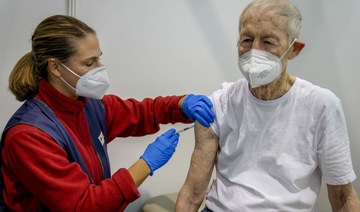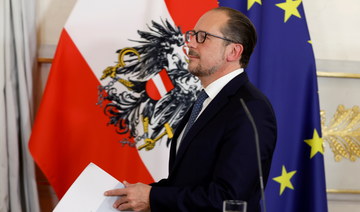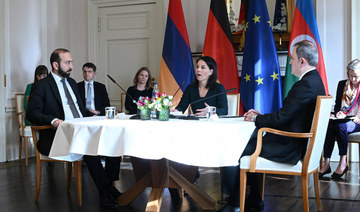LONDON/MILAN: Europe has become the epicenter of the pandemic again, prompting some governments to consider re-imposing unpopular lockdowns in the run-up to Christmas and stirring debate over whether vaccines alone are enough to tame COVID-19.
Europe accounts for more than half of the average 7-day infections globally and about half of latest deaths, according to a Reuters tally, the highest levels since April last year when the virus was at its initial peak in Italy.
Governments and companies are worried the prolonged pandemic will derail a fragile economic recovery. Countries including the Netherlands, Germany, Austria and the Czech Republic are taking or planning measures to curb the spread.
The fresh concerns over what British Prime Minister Boris Johnson described on Friday as “storm clouds” over Europe come as successful inoculation campaigns have plateaued ahead of the winter months and flu season.
About 65 percent of the population of the European Economic Area (EEA) — which includes the European Union, Iceland, Liechtenstein and Norway — have received two doses, according to EU data, but the pace has slowed in recent months.
Take-up in southern European countries is around 80 percent, but hesitancy has hampered rollout in central and eastern Europe and Russia, leading to outbreaks that could overwhelm health care.
Germany, France and the Netherlands are also experiencing a surge in infections, showing the challenge even for governments with high acceptance rates.
To be sure, hospitalizations and deaths are much lower than a year ago and big variations by country in use of vaccines and boosters as well as measures like social distancing make it hard to draw conclusions for the whole region.
But a combination of low vaccine take-up in some parts, waning immunity among those inoculated early and complacency about masks and distancing as governments relaxed curbs over the summer are likely to blame, virologists and public health experts told Reuters.
“If there’s one thing to learn from this it’s not to take your eye off the ball,” said Lawrence Young, a virologist at Warwick Medical School in the UK.
The World Health Organization’s report for the week to Nov. 7 showed that Europe, including Russia, was the only region to record a rise in cases, up 7 percent, while other areas reported declines or stable trends.
Similarly, it reported a 10 percent increase in deaths, while other regions reported declines.
The Netherlands was expected to announce on Friday evening a three-week partial lockdown that will be Western Europe’s first since the summer — ordering bars and restaurants to close early and sporting events to be held without audiences.
Germany will reintroduce free COVID-19 tests from Saturday, acting health minister Jens Spahn said on Friday. A draft law in Germany would allow for measures such as compulsory face masks and social distancing in public spaces to continue to be enforced until next March.
Austria’s government is likely to decide on Sunday to impose a lockdown on people who are not vaccinated, Chancellor Alexander Schallenberg said on Friday.
Most EU countries are deploying extra shots to the elderly and those with weakened immune systems, but expanding vaccination to more of the population should be a priority to avoid steps like lockdown, scientists said.
“The real urgency is to widen the pool of vaccinated people as much as possible,” said Carlo Federico Perno, head of microbiology and immunology diagnostics at Rome’s Bambino Gesù Hospital.
The EU’s medicines regulator is also evaluating the use of Pfizer and BioNTech’s vaccine in 5 to 11-year-olds.
Norway will offer a third COVID-19 vaccine dose to everyone aged 18 and older and will give municipalities the option of using digital “corona passes,” the government said on Friday. Norway has so far given a third dose only to those aged 65 and older.
From Dec. 1, Italy will also offer the third dose to people over 40.
“This (outbreak) will probably make the EU look at booster doses and say ‘we do need them pronto’,” said Michael Head, senior research fellow in global health at the University of Southampton.
Still struggling to ramp up shots, central and eastern European governments have had to take drastic action.
Latvia, one of the least vaccinated countries in the EU, imposed a four-week lockdown in mid-October. Its parliament voted on Friday to ban lawmakers who refuse vaccination from voting on legislature and participating in discussions.
The Czech Republic, Slovakia and Russia have also tightened restrictions.
Vaccines alone are not the silver bullet to defeat the pandemic in the long term, virologists say.
Several pointed to Israel as an example of good practice: in addition to inoculations, it has reinforced mask wearing and introduced vaccine passports after cases spiked a few months ago.
Measures such as spacing, masks and vaccine mandates for indoor venues are essential, said Antonella Viola, professor of immunology at Italy’s University of Padua.
Europe becomes COVID-19’s epicenter again, some countries look at fresh curbs
https://arab.news/gvuda
Europe becomes COVID-19’s epicenter again, some countries look at fresh curbs
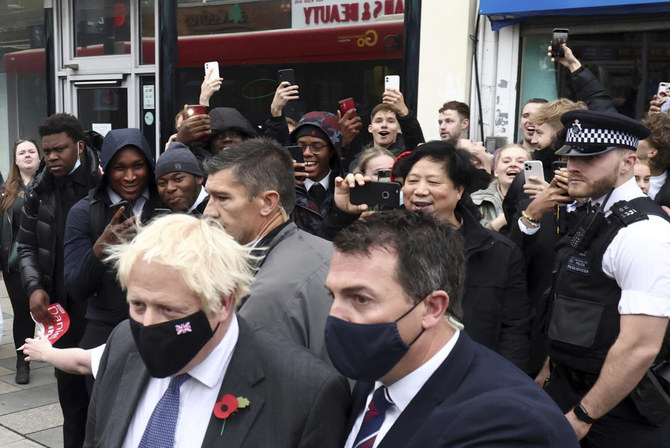
- Europe accounts for more than half of the average 7-day infections globally and about half of latest deaths
- Governments and companies are worried the prolonged pandemic will derail a fragile economic recovery
Armenia’s prime minister in Russia for talks amid strain in ties
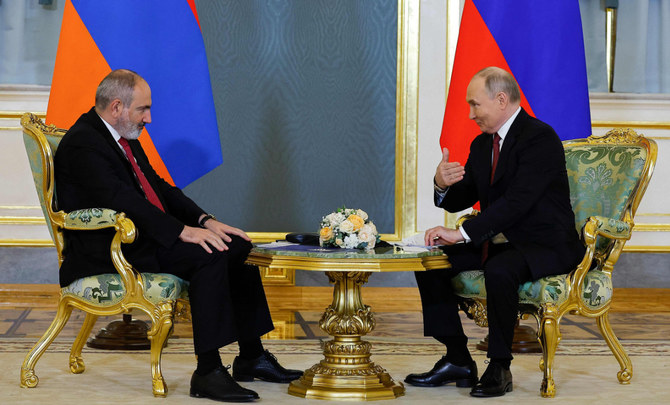
- Putin hosted Nikol Pashinyan for talks following a summit of the Eurasian Economic Union, a Moscow-dominated economic alliance
- Armenia’s ties with its longtime sponsor and ally Russia have grown increasingly strained after Azerbaijan waged a lightning military campaign in September to reclaim the Karabakh region
MOSCOW: Armenia’s prime minister visited Moscow and held talks Wednesday with Russian President Vladimir Putin amid spiraling tensions between the estranged allies.
Putin hosted Nikol Pashinyan for talks following a summit of the Eurasian Economic Union, a Moscow-dominated economic alliance. that they both attended earlier in the day. The negotiations came a day after Putin began his fifth term at a glittering Kremlin inauguration.
In brief remarks at the start of the talks, Putin said that bilateral trade was growing, but acknowledged “some issues concerning security in the region.”
Pashinyan, who last visited Moscow in December, said that “certain issues have piled up since then.”
Armenia’s ties with its longtime sponsor and ally Russia have grown increasingly strained after Azerbaijan waged a lightning military campaign in September to reclaim the Karabakh region, ending three decades of ethnic Armenian separatists’ rule there.
Armenian authorities accused Russian peacekeepers who were deployed to Nagorno-Karabakh after the previous round of hostilities in 2020 of failing to stop Azerbaijan’s onslaught. Moscow, which has a military base in Armenia, has rejected the accusations, arguing that its troops didn’t have a mandate to intervene.
The Kremlin, in turn, has been angered by Pashinyan’s efforts to deepen ties with the West and distance his country from Moscow-dominated security and economic alliances.
Just as Pashinyan was visiting Moscow on Wednesday, Armenia’s Foreign Ministry announced that the country will stop paying fees to the Collective Security Treaty Organization, a Russia-dominated security pact. Armenia has previously suspended its participation in the grouping as Pashinyan has sought to bolster ties with the European Union and NATO.
Russia was also vexed by Armenia’s decision to join the International Criminal Court, which last year indicted Putin for alleged war crimes connected to the Russian action in Ukraine.
Moscow, busy with the Ukrainian conflict that has dragged into a third year, has publicly voiced concern about Yerevan’s westward shift but sought to downplay the differences.
Kremlin spokesman Dmitry Peskov conceded Tuesday that “there are certain problems in our bilateral relations,” but added that “there is a political will to continue the dialogue.”
AstraZeneca to withdraw COVID vaccine globally as demand dips

- AstraZeneca says initiated worldwide withdrawal due to “surplus of available updated vaccines”
- Drugmaker has previously admitted vaccine causes side effects such as blood clots, low blood platelet counts
AstraZeneca said on Tuesday it had initiated the worldwide withdrawal of its COVID-19 vaccine due to a “surplus of available updated vaccines” since the pandemic.
The company also said it would proceed to withdraw the vaccine Vaxzevria’s marketing authorizations within Europe.
“As multiple, variant COVID-19 vaccines have since been developed there is a surplus of available updated vaccines,” the company said, adding that this had led to a decline in demand for Vaxzevria, which is no longer being manufactured or supplied.
According to media reports, the Anglo-Swedish drugmaker has previously admitted in court documents that the vaccine causes side-effects such as blood clots and low blood platelet counts.
The firm’s application to withdraw the vaccine was made on March 5 and came into effect on May 7, according to the Telegraph, which first reported the development.
The Serum Institute of India (SII), which produced AstraZeneca’s COVID-19 vaccine under the brand name Covishield, stopped manufacturing and supply of the doses since December 2021, an SII spokesperson said.
London-listed AstraZeneca began moving into respiratory syncytial virus vaccines and obesity drugs through several deals last year after a slowdown in growth as COVID-19 medicine sales declined.
Ex-national security adviser criticizes UK PM for not suspending arms sales to Israel

- Lord Peter Ricketts: ‘Pity’ govt ‘could not have taken a stand on this and got out ahead of the US’
- American decision to pause delivery of weapons seen as warning to Israel to abandon or temper plan to invade Rafah
LONDON: A former UK national security adviser has condemned Prime Minister Rishi Sunak for failing to suspend weapons sales to Israel, The Independent reported on Wednesday.
After the US paused a delivery of bombs, Sunak has yet to follow suit despite mounting pressure from within his own Conservative Party.
Lord Peter Ricketts, a life peer in the House of Lords and retired senior diplomat, said Britain should have been “ahead of the US” in ending arms sales to Israel.
The US decision to pause the shipment of bombs is seen as a warning to Israel to abandon or temper its plan to invade Rafah in southern Gaza.
More than 1 million Palestinian civilians are sheltering in the city after being forced out of northern sections of the enclave.
Ricketts said it is a “pity” that “the government could not have taken a stand on this and got out ahead of the US.”
Conservative MP David Jones made the same call in comments to The Independent, saying: “We should give similar consideration to a pause.”
He added: “Anyone viewing the distressing scenes in Gaza will want to see an end to the fighting. Hamas is in reality beaten. Now is the time for diplomacy to bring this dreadful conflict to an end.”
At Prime Minister’s Questions in the House of Commons, Sunak faced a flurry of questions over Britain’s potential ties to an Israeli invasion of Rafah. He said the government’s position remains “unchanged.”
Taliban deny Pakistani claims of Afghan involvement in attack on Chinese workers

- According to Islamabad, suicide attack that killed 5 Chinese in Pakistan was planned in Afghanistan
- Afghan Defense Ministry says the March attack showed weakness of Pakistan’s security agencies
KABUL: The Taliban on Wednesday rejected allegations of Afghan involvement in a recent deadly attack on Chinese workers in neighboring Pakistan.
The five Chinese nationals, who were employed on the site of a hydropower project in Dasu in northwestern Khyber Pakhtunkhwa province bordering Afghanistan, were killed alongside their driver in a suicide blast on March 26.
Pakistan’s military said on Tuesday that the attack was planned in Afghanistan and that the suicide bomber was an Afghan citizen.
Maj. Gen. Ahmad Sharif, a spokesperson for Pakistan’s army, also told reporters that Islamabad had “solid evidence” of militants using Afghan soil to launch attacks in Pakistan, that since the beginning of the year such assaults had killed more than 60 security personnel and that authorities in Kabul were unhelpful in addressing the violence.
The Taliban’s Ministry of Defense responded on Wednesday that the claims were “irresponsible and far from the reality.
“Blaming Afghanistan for such incidents is a failed attempt to divert attention from the truth, and we strongly reject it,” Enayatullah Khwarazmi, the ministry’s spokesperson, said in a statement.
“The killing of Chinese citizens in an area of Khyber Pakhtunkhwa, which is under tight security cover of the Pakistani army, shows the weakness of the Pakistani security agencies or cooperation with the attackers.”
The Dasu attack followed two other major assaults in regions where China has invested more than $65 billion in infrastructure projects as part of its wider Belt and Road Initiative.
On March 25, a naval air base was attacked in Turbat in Pakistan’s Balochistan province, and on March 20, militants stormed a government compound in nearby Gwadar district, which is home to a Chinese-operated port.
Pakistan is home to twin insurgencies, one by militants related to the Tehreek-e-Taliban Pakistan — the Pakistani Taliban — and the other by ethnic separatists who seek secession in southwestern Balochistan province, which remains Pakistan’s poorest despite being rich in natural resources.
While the attacks in Balochistan were claimed by the Baloch Liberation Army — the most prominent of several separatist groups in the province, no group claimed responsibility for the one in Dasu.
Blaming it on Afghanistan, however, was “baseless,” according to Naseer Ahmad Nawidy, an international relations professor at Salam University in Kabul.
“The insurgency in the region has existed for very long now and cannot be attributed to a specific area or country. Pakistan looks at the Islamic Emirate in its current form as a threat to its interests. The Pakistan government needs to develop its relations with the Islamic Emirate based on equal rights and goodwill for stability in the whole region,” Nawidy told Arab News.
“Stability in the region requires mutual cooperation and trust. The governments in Afghanistan and Pakistan must end the relations crisis at the earliest. Repeating such claims will further increase the tensions and may cause enmity between the two countries.”
Abdul Saboor Mubariz, a political scientist and lecturer at Alfalah University in Jalalabad, said that Pakistan’s claims were meant to put pressure on the Taliban to help Islamabad in its campaign against the TTP.
“Pakistan’s government is using different forms of pressure such as forcible deportation of Afghan refugees, claims about security threats from Afghanistan, closing border points and creating challenges for Afghan traders,” he said, adding that accusations and claims of links to attacks were affecting the Taliban administration as it still sought recognition from foreign governments.
“The claims are critical for the Islamic Emirate as it is seeking engagement with the countries in the region and across the globe, while the government remains unrecognized by all world countries.”
India PM Modi’s party deletes X post accused of targeting Muslims

- Video featured opposition politicians scheming to abolish programs for marginalized Hindus, distribute them to Muslims
- India’s PM Modi, expected to win polls, has made controversial remarks in election speeches, referring to Muslims as “infiltrators”
New Delhi: Indian Prime Minister Narendra Modi’s party on Wednesday deleted a cartoon video posted on social media platform X that was criticized for targeting minority Muslims during an ongoing national election.
India’s election code bans campaigning based on “communal” incitement but the Hindu-nationalist Bharatiya Janata Party (BJP) has frequently invoked the country’s main religious divide on the campaign trail.
The video, posted by an official BJP account, featured caricatures of opposition politicians scheming to abolish special affirmative action programs for marginalized Hindu groups and instead distribute them to Muslims.
The election commission wrote to the platform’s Indian office on Tuesday saying the “objectionable” post violated Indian law.
On Wednesday the original post had disappeared from the platform, with a notice saying it had been deleted.
A police complaint filed by the opposition Congress party accused the video of promoting “enmity between different religions.”
Modi, who is widely expected to win a third term in office when the six-week general election concludes next month, has made similar claims to the video in campaign appearances since last month.
He has used public speeches to refer to Muslims as “infiltrators” and “those who have more children,” prompting condemnation from opposition politicians, who have complained to election authorities.
On Tuesday he again said that his political opponents would “snatch” affirmative action policies meant for disadvantaged Hindus and redirect them to Muslims.
Modi remains widely popular a decade after coming to power, in large part due to his government’s positioning of the nation’s majority faith at the center of its politics, despite India’s officially secular constitution.
That in turn has made India’s 220-million-plus Muslim population increasingly anxious about their future in the country.
The BJP last month published another contentious animated video on Instagram in which a voiceover warned that if the opposition came to power, “it will snatch all the money and wealth from non-Muslims and distribute them among Muslims, their favorite community.”
The video was removed after several users reported it for “hate speech.”



